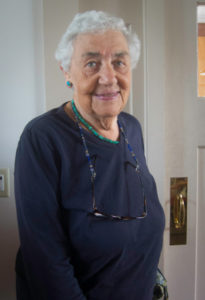 Woods Hole summer resident Esther Rowland, a former Associate Dean at Barnard College, gives a talk about a memoir she has written about her life, which has spanned much of the Twentieth Century.
Woods Hole summer resident Esther Rowland, a former Associate Dean at Barnard College, gives a talk about a memoir she has written about her life, which has spanned much of the Twentieth Century.
She has called the book: Fellow Traveler, a concept that holds three meanings: first, her journey through life with her husband of 63 years Lewis P. (Bud) Rowland M.D., former chair of the Department of Neurology at Columbia University’s College of Physicians and Surgeons, second: a description of some of their more memorable travels.; and third, the political connotation of a political path she and Bud chose as members of the non-communist left.
Esther starts with stories of her early childhood on West 86th Street in Manhattan, the family’s move to Flushing to save money on rent in the time of the Great Depression, and then to the Grand Concourse, where she did most of her growing up. She tells about the public schools she attended and some of the problems the Jewish children had with their Irish teachers. She also describes her growing political awareness at the time of the Spanish Civil War, an awareness that blossomed into a strong “more than liberal” identity in her later years. Her desire to be both a scholar, and a wife and mother, becomes a major theme of the book.
Esther recounts her search for the right husband; the events that led up to her meeting Bud; their twelve-week courtship and marriage; the brush with McCarthy-ites and how that turned out. She talks about starting a family in the post-Second World War economy and its effect on women who wished to work outside the home.
Esther tells of her experience as pre-med advisor at the University of Pennsylvania and later at Barnard College. She describes how she approached her job in an era when places in professional schools that formerly discriminated against women and minorities were then accepting these applicants by order of the federal government. It’s a story about changing old prejudices, prejudices that had been held by medical schools and law schools, by college faculty members, and by the potential applicants.
Esther also reveals how the values that she and Bud shared about equality and social justice played into their day-to-day actions as citizens and as parents. She talks about the fight to integrate the public schools in Englewood, New Jersey, about the struggle to integrate neighborhoods, and keep them integrated. She describes how her two sons dealt with the draft to fight in a war they regarded as unnecessary and unjust.
In her final chapters, Esther recounts the stories of two close friends who had remarkable tales to be told. And she ends the book with a description of five trips with Bud: to China; to India; to Cuba; to Marseille; and to the San Juan River in Utah. The book is presented as an account of a “normal life” to a European friend who witnessed the holocaust and the Communist take-over of the countries that bordered the Soviet Union. Esther’s life was comparatively normal in this context, but as you read on you find that it has been far from being boring or humdrum.
Copies of “Fellow Traveler” will be available for sale at the Library on the evening of Esther’s talk.
